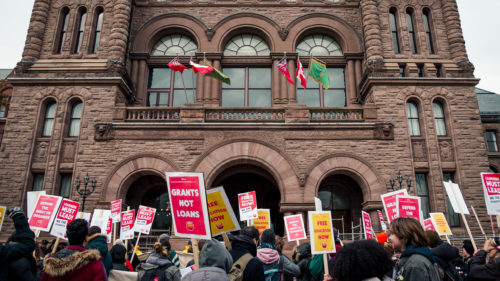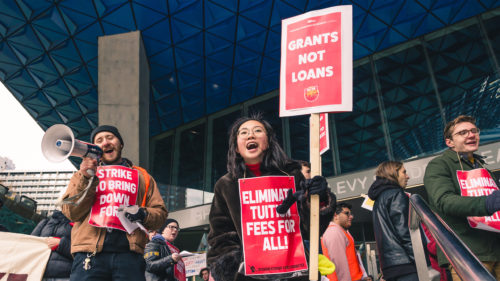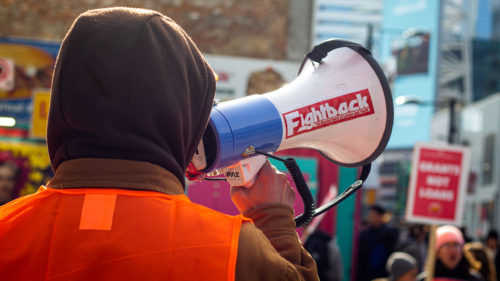By Valerie Dittrich and Alexandra Holyk
Ryerson community members temporarily shut down the intersection at Yonge and Dundas streets while marching to Queen’s Park as they protested education cuts imposed by the provincial government.
“The students, united, will never be defeated,” was chanted by participants in the one-day student strike held on Wednesday as they blocked traffic in one of the city’s busiest intersections.
“Our goal with this strike movement is to create a political crisis that will bring down the Ford government,” said Hermes Azam, chair of the Ryerson Student Strike Committee (RSS) and former president of Socialist Fightback.
The strike began at 7 a.m. with soft picket lines at the corner of Yonge and Gould streets. At noon, a rally was held in front of the Student Campus Centre (SCC), where students marched from Yonge-Dundas Square to OCAD University. Around 100 supporters from both universities and local unions marched on the streets to protest in front of Queen’s Park.
The one-day student strike was primarily organized by the RSS, a combination of students and members of Socialist Fightback.
“[Students] don’t like the cuts, it’s affecting them, it’s hurting their lives,” said Olive Pape, member of RSS and Socialist Fightback. “They feel like they can’t do anything. And we really want to bring that fight to them and show them that it’s not over.”
“We need to send a louder message to the government,” she said.

Ryerson Students’ Union (RSU) vice-president education, Kwaku Agyemang arrived at the picket outside of the Sheldon and Tracy Levy Student Learning Centre (SLC) to show support for the strike. He said he was hoping to get “hundreds of thousands” students come out to the picket lines and rally.
“We have to show the government that we won’t stop until they reverse these cuts and reverse these harmful decisions,” he said. “We put ourselves in vulnerable positions—going to post-secondary to be successful in society—and we need to make sure our rights [as students] are protected.”
This comes after the RSU voting down RSS’ motion at their Oct. 23 Board of Directors meeting (BoD) to “publicly” support a one-day student strike on Wednesday.
Past concerns
RSU and Continuing Education Students’ Association Ryerson (CESAR) executives cited concerns with the accessibility of the Sept. 25 general assembly where 200 people voted in favour of executing a strike.
“We had accessibility concerns in terms of [the SLC] being a limited space,” said Agyemang. “We have the resources to reach out to more students and do consultation through a digital platform. It makes it easy since Ryerson is a commuter school, that’s why we wanted to meet [students] halfway.”
It is unclear if everyone who voted was a Ryerson student.
“We simply went by the honour system,” said Azam, citing that the strike initiatives started off as a “grassroots effort.”
“We encouraged only Ryerson students to vote [in the general assembly]…It’s not to say that 100 per cent of the attendees were students. There was supportive from the broader labour movements, the New Democratic Party (NDP) and student unions from outside of campus.”
During a sit-in performed by RSS in front of the RSU offices, Agyemang and CESAR president Nicole Brayiannias said that they would be releasing a survey to students asking how they would like to go forward with the day of action.
The results garnered just under 1,000 answers and the “majority” of the feedback was in favour of a strike, according to Agyemang.

“We were trying to engage as many students as we could in the process to be as democratically accessible as possible,” said Brayiannias. “It’s just that we wanted to ensure that whatever action took place, it was where students were at on campus.”
A second general assembly was held on Oct. 30 in the SLC where the RSS put forward a motion to give the government a list of demands.
This included stopping cuts to the Ontario Student Assistance Program (OSAP), eliminating tuition fees and repealing the Student Choice Initiative (SCI)—giving post-secondary students the choice to opt-out of non-essential fees—that was announced by the Ford government on Jan. 17, 2019.
Students mobilizing in different ways
Brayiannas said CESAR students who aren’t on campus as much as full-time students were encouraged to not go to their evening classes. CESAR hosted a workshop later in the day to plan future actions and “trying to organize within ourselves to just educate on the work that’s been done.”
During the rally in front of the SCC, Chris Glover, NDP member of provincial parliament (MPP) for Spadina-Fort York, spoke to The Eyeopener about the work he’s been doing in provincial parliament advocating for post-secondary students.
“I was in the House during question period and I asked a question about the strike and I can tell you, from our side of the house, [we] showed total support,” he said. “For the students on the strike, pushing back on this government [is important] because this government needs to feel the heat for the action.”

Although students were not granted academic amnesty for the strike, professors like Antoine Panaioti cancelled his class in support of the strike.
“What the student movement needs of Ontario, in general, is greater numbers,” he said, citing the 2012 Quebec student strike, which lasted several months.
“I think we need two things—one is more visibility so that more students join. And the other, obviously, is sending a message to Queen’s Park. And I hope that message will be heard.”
The RSS, RSU and CESAR all said they plan on holding another larger student movement in protest against the cuts to education, however, nothing official has been planned yet.












Anonymous
Last time I check the RSS is the Ryerson Science Society not the Ryerson Student Strike. You might want to check before making up abbreviations as RSS is registered with the BOG as the Ryerson Science Society not Ryerson student strike.